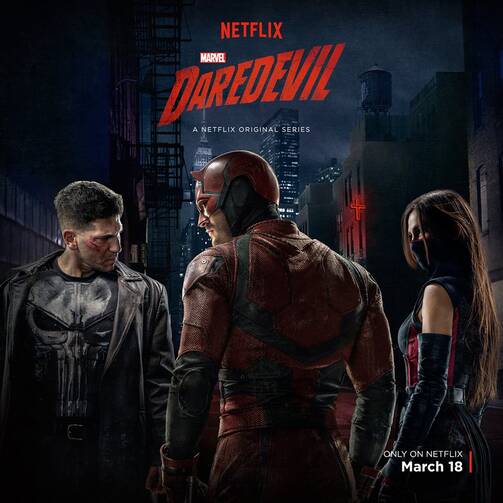Last weekend Netflix launched the new season of its comic book inspired series “Daredevil,” about blind New York City lawyer Matt Murdock, who doubles as the superhero protector of Hell’s Kitchen [light spoilers to follow]. When the show debuted last fall, it turned heads both for its gritty realism and its incredible fight sequences, which really are like nothing on television anywhere.
But what was equally interesting about “Daredevil” was the main character’s Catholicism. Television has such a difficult time with religion, almost always turning it into hocus pocus, simplistic aphorisms or inhumane preachery. (And hey, let’s be honest, we who work in the church have some role in all of that. To the extent that we preach or behave in ways that don’t make sense to people, we can hardly be frustrated that media portrayals are equally nonsensical. If we want to say our lives and struggles reflected in a meaningful way onscreen, we may need to spend more time on barstools and in coffee shops, being real with people.)
“Daredevil” (along with Netflix’s prison show “Orange is the New Black”) was that rarest of creatures, a show that could talk about religion in a way that felt authentic to the questions and struggles we all have, yet was still inviting to those who didn’t have such beliefs. It even had a believable-sounding priest (and OINTB a great nun)—which of late has been about as likely as seeing a unicorn.
The second season, while not quite as engaged with the religious dimension of its protagonist, nonetheless frames its main story around a key question we wrestle with as Catholics, one the pope has recently addressed himself: Is it okay to kill the bad guys? Daredevil insists all life is precious; bad guys can be kicked, punched, etc., but they are not to be killed. Meanwhile fellow vigilante the Punisher (a fallen away Catholic himself) insists the corrupt and villainous have abnegated all rights, including the right to continue living.
It’s meaty stuff, and also potentially risky territory. As every recent movie starring Superman illustrates, no one likes an earnest, preachy superhero. And the season both has its struggles along the way and also rises above the predictable. (The final situation of one character in particular is really quite something.)
It also offers this wonderful moment: Murdock and his partners find themselves at the funeral of a New York City low life who had done terrible things in life, even killed people. The parish priest presiding at the funeral recounts the wads of money and loot the man would sometimes dump in the collection basket, trying to earn some kind of redemption, only to go back out there and do it all again.
“So you might say, one life gone, one sinful life,” the priest says. He goes on: “But one person is not just one person. In each of us there is a world, webbing out, reaching others, creating reactions. Sometimes equal, sometimes opposite.
“We rush to say one life gone. But each of us is a world. And today, a world has been lost.”
No matter one’s own stand on the death penalty, television is clearly the better for such a rich, thoughtful take on the issue. And so is our church.
Jim McDermott, S.J., a screenwriter, is America’s Los Angeles correspondent. Twitter: @PopCulturPriest.








